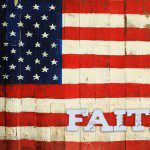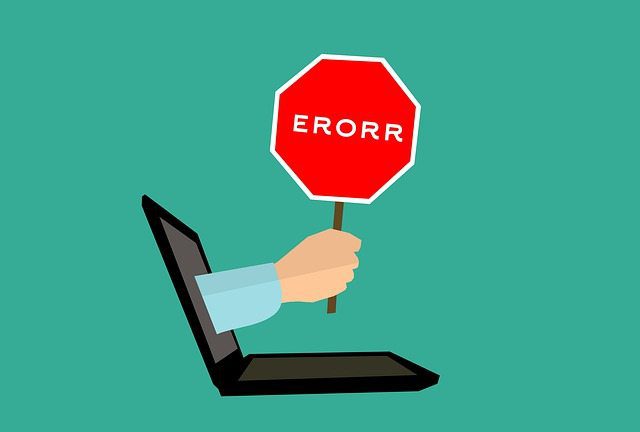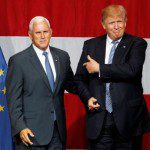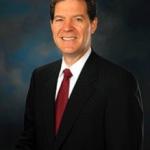As Inauguration Week presses on, our debate about the role of religion in public life reaches a quadrennial peak. This year, the Washington National Cathedral is under fire from some of its Episcopalian constituency for its participation in the Trump Inaugural.
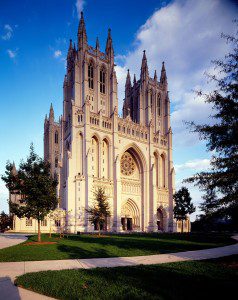
Designated by Congress as our “national house of prayer,” the Cathedral has often played a role in the inauguration of presidents, as well as significant national events such as state funerals, memorial services for American heroes, and services following national tragedies. Should the Cathedral shirk its historic role in 2017 because the incoming president is an obnoxious fool? A larger-than-usual number of people are upset about the Cathedral’s participation, and I understand why.
There are also people who would prefer that religious institutions, leaders, and symbols be completely excluded from these kinds of events. For them, no president – no matter how personally worthy or godly – should receive public prayers, blessings, or any manifestations of religion. It’s simply not proper, helpful, or appropriate to incorporate the trappings of faith, or even of civil religion, into government.
But that’s not the argument we’re having.
Opponents of the Cathedral’s participation are arguing that Trump is uniquely problematic, an unworthy recipient of the National Cathedral’s ministrations. Whereas previous presidents have, to varying degrees, offended Christianity with various policy views, they were all men of good faith and goodwill. With few exceptions, Episcopalians felt that the Cathedral (through its clergy and musicians) could proudly lend its choir to the swearing-in ceremony or open its doors for a prayer service.
Trump changes all that. He is, critics allege, so manifestly unfit and unchristian that it undermines the ministry and the integrity of the Cathedral to regard him as just another incoming president.
Diana Butler Bass, a historian and Episcopal laywoman, noted on Facebook that Trump’s movement is at odds with the Jesus movement Christians profess to follow. The Rev. Gary Hall, a former Cathedral dean, laid out the case against the Cathedral’s participation in a commentary published by Religion News Service:
In his words and actions, Trump has shown himself to be outside the bounds of all mainstream norms of Christian faith and practice. His often-expressed xenophobia and misogyny, not to mention his mocking of the disabled and admission of abusive behavior, place him well outside the values of compassion and respect for human dignity that mark historic Christianity at its best. It is simply inappropriate to use a precious institution such as Washington National Cathedral to suggest that the church bestows its blessing on a leader so obviously beyond the pale of Christian thought.
The Cathedral’s leadership has affirmed and defended its participation. So has the Most Reverend Michael Curry , Presiding Bishop of The Episcopal Church. The choir will sing at the swearing-in service Friday, January 20, though individual choir members are permitted to opt out. And the Cathedral will host a prayer service for the new President and guests the next morning, as it did for Presidents F. Roosevelt, Reagan, G. H. W. Bush, G. W. Bush, and Obama.
As regular readers know, I strongly dislike and disapprove of Donald Trump. I think his campaign was a clown show. I shudder to think of the lasting damage he has done to the Republican Party, and fear for what he may do to our nation.
Even so, I believe the National Cathedral made the right decision.
Trump is just a man. Like other presidents, he will be in power for a while and then will be gone. Sure, he seems immoral and some of his platform is truly vile. But we have had immoral presidents before, even if they have not been as defiant and unrepentant. We will have immoral presidents again. We have had presidents with corrupt values and bad ideas before, even if Trump’s are especially unchristian or unamerican. But we may elect someone like that again.
The National Cathedral is a great institution, but it is not in a position to judge men’s souls. Its clergy are functionaries in a great faith, and also occasionally in a civil religion that they cannot finally define or control. They offer a ministry and should serve all comers, even presidents they may not like.
I am particularly sensitive to the question of whether opponents of Trump receiving the Cathedral’s ministry would have applied the same criticism to any Republican president that might have been elected in 2016. After all, while Trump’s rhetoric was especially uncouth, he agrees with others in his party about many of the great issues of the day. Critics may concede that Ted Cruz, for instance, did not mock a disabled reporter or sexually assault women. But they might find his attitudes on LGBT equality or abortion rights to be even more offensive than Trump’s.
Hall, the former dean, does not want “the most visible symbol of compassionate faith in America” to “lend itself to endorsing or espousing their shrunken, fearful vision of our national life.” Surely the Cathedral can proclaim the gospel and be a national house of prayer without any endorsement, expressed or implied, of Trump’s vision.
Donald Trump showed himself to be an obnoxious, race-baiting narcissist time and time again during his 18 months on the national stage. He lost the popular vote and benefited from foreign interference. But under our Constitutional order, he is our duly elected president.
He should hear the choir’s songs of praise and its clergy’s prayers – all offered to a God whom he should fear as he pleads for blessings we must hope he humbly receives.

